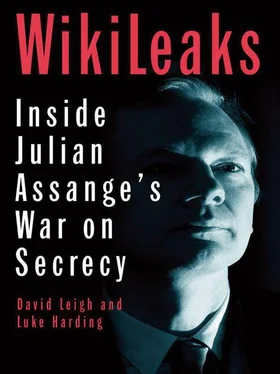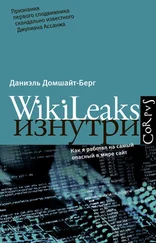Harding, Luke - WikiLeaks - Inside Julian Assange's War on Secrecy
Здесь есть возможность читать онлайн «Harding, Luke - WikiLeaks - Inside Julian Assange's War on Secrecy» весь текст электронной книги совершенно бесплатно (целиком полную версию без сокращений). В некоторых случаях можно слушать аудио, скачать через торрент в формате fb2 и присутствует краткое содержание. Жанр: Старинная литература, на английском языке. Описание произведения, (предисловие) а так же отзывы посетителей доступны на портале библиотеки ЛибКат.
- Название:WikiLeaks: Inside Julian Assange's War on Secrecy
- Автор:
- Жанр:
- Год:неизвестен
- ISBN:нет данных
- Рейтинг книги:3 / 5. Голосов: 1
-
Избранное:Добавить в избранное
- Отзывы:
-
Ваша оценка:
- 60
- 1
- 2
- 3
- 4
- 5
WikiLeaks: Inside Julian Assange's War on Secrecy: краткое содержание, описание и аннотация
Предлагаем к чтению аннотацию, описание, краткое содержание или предисловие (зависит от того, что написал сам автор книги «WikiLeaks: Inside Julian Assange's War on Secrecy»). Если вы не нашли необходимую информацию о книге — напишите в комментариях, мы постараемся отыскать её.
WikiLeaks: Inside Julian Assange's War on Secrecy — читать онлайн бесплатно полную книгу (весь текст) целиком
Ниже представлен текст книги, разбитый по страницам. Система сохранения места последней прочитанной страницы, позволяет с удобством читать онлайн бесплатно книгу «WikiLeaks: Inside Julian Assange's War on Secrecy», без необходимости каждый раз заново искать на чём Вы остановились. Поставьте закладку, и сможете в любой момент перейти на страницу, на которой закончили чтение.
Интервал:
Закладка:
Today, however, Davies’s attention was caught by the Guardian ’s foreign pages: “American officials are searching for Julian Assange, the founder of WikiLeaks, in an attempt to pressure him not to publish thousands of confidential and potentially hugely embarrassing diplomatic cables that offer unfiltered assessments of Middle East governments and leaders.”
The story continued: “The Daily Beast , a US news reporting and opinion website, reported that Pentagon investigators are trying to track down Assange – an Australian citizen who moves frequently between countries – after the arrest of a US soldier last week who is alleged to have given the whistleblower website a classified video of American troops killing civilians in Baghdad. The soldier, Bradley Manning, also claimed to have given WikiLeaks 260,000 pages of confidential diplomatic cables and intelligence assessments. The US authorities fear their release could ‘do serious damage to national security’.”
Davies was thunderstruck. An unknown 22-year-old private had apparently downloaded the entire contents of a US classified military database. Manning was held in prison in Kuwait. But was there any way the Guardian could lay its hands on the cables? “I felt this was the biggest story on the planet,” says Davies. He searched online for “Bradley Manning”, and found the transcripts published by Wired.com . These detailed the conversations with former hacker Adrian Lamo, in which Manning apparently confirmed he had illicitly downloaded more than a quarter of a million classified documents, talked of “almost criminal political back-dealings” by the US, and said: “Hillary Clinton and several thousand diplomats around the world are going to have a heart attack.”
If only a fraction of what Manning said was true, WikiLeaks was now sitting on hundreds of thousands of cables detailing dubious diplomatic operations, war crimes in Afghanistan and Iraq, and God knows what else. It was a goldmine. “There was clearly a bigger story here. It wasn’t hard to see,” Davies says. His reporter’s radar was bleeping with excitement. But amazingly, nobody else on what used to be known as Fleet Street seemed to have yet worked out the massive potential dimensions.
The key to accessing the cables – and to the stories they contained – had to be Julian Assange. Davies himself had never met him but was aware of Assange’s website: he had come across WikiLeaks during the Guardian ’s 2009 investigation into tax evasion and Swiss banks. He wanted to get to Assange fast, before the Pentagon investigators or anyone else. But where was he? The Daily Beast reported that Assange had cancelled a US public appearance in Las Vegas due to “security concerns”; a group of former US intelligence officers had warned publicly that Assange’s physical safety was at risk. There were few clues.
Davies sent a series of exploratory emails to Assange. He offered to assist on Manning, and to publicise the 22-year-old’s plight. On 16 June, he wrote: “Hi Julian, I spent yesterday in the Guardian office arguing that Bradley Manning is currently the most important story on the planet. There is much to be done, and it will take a little time. But right now, I think the crucial thing is to track and expose the effort by the US government to suppress Bradley, you, WikiLeaks, and anything that either of you may want to put in the public domain.” The email went on: “Can you communicate with me about that; or hook me up with somebody who can? Maybe one possibility might be for me to talk to any lawyer who has been helping Bradley. Good luck, Nick.”
This tentative pitch elicited a reply from Assange – but not a very helpful one. Assange merely sent back a press release describing how WikiLeaks had persuaded Icelandic parliamentarians to build a “new media haven” in Iceland.
Davies went up to the Guardian office in London to consult David Leigh, a colleague and old friend. Leigh had met Assange earlier in the year and, having failed to reach a deal over the Apache helicopter video, was sceptical. He warned Davies that the Australian was unpredictable. He doubted Assange would be willing to co-operate. But, Leigh added, “You’re welcome to try.”
Davies persevered. He sent Assange another email offering “to travel anywhere to meet you or anybody else, to take any of this forward”. This time Assange was more forthcoming. He sent back the contact name of Birgitta Jónsdóttir, the Icelandic parliamentarian who had co-produced the Apache video, and whose tweets the US department of justice would later attempt to subpoena. He also mentioned Kristinn Hrafnsson, his loyal deputy. Assange signed off: “I’m a bit hard to interview presently for security reasons, but send me ALL your contacts.” Davies sent further emails to Jónsdóttir, Hrafnsson and other WikiLeaks players, and spoke to several of them on the phone. He felt he was beginning to make progress. But he was also painfully aware that if he simply demanded that WikiLeaks share its information, Assange would see him as yet another representative of the greedy, duplicitous mainstream media – or MSM, as it is derisively described on much of the internet. Something more subtle was called for – something that ultimately gave the Guardian access to the cables, but perhaps also offered Assange a way to resolve his own problems.
On the evening of Sunday 19 June, Davies received a phone call. His informant said, “Don’t tell Julian I told you, but he’s flying to Brussels to give a press conference tomorrow at the European parliament.” Excited, Davies called Leigh, who was at home in London. Leigh was absorbed in a television detective serial, and seemed far from impressed by the development. Davies promptly dialled the editor of the Guardian , Alan Rusbridger. The pair had started on the paper together in 1979 as junior reporters, and had lived in neighbouring flats in London’s Clerkenwell. Rusbridger trusted Davies completely, and had given him free rein to pursue investigative projects, believing he would always bring back something of value.
This unusual arrangement had seen Davies launch long-term investigations into a range of areas, including poverty in the UK, Britain’s education system, and police corruption. Davies’s challenging, in-depth journalism had made political waves and proved popular with readers.
“Alan, what do you know of this guy Bradley Manning?” Davies asked.
“Not much,” Rusbridger replied.
“Well, it’s the biggest story on the planet …”
Yes, Rusbridger agreed, “Go to Brussels.”
There was no transport to get Davies to Brussels in time for the press conference, however, so the editor suggested that Traynor, who was highly experienced and who was based in the city, should try to buttonhole Assange. Davies emailed Traynor that night:
“Bradley Manning, aged 22, is an American intelligence analyst who has been working at a US base outside Baghdad, where he had access to two closed communication networks. One carried traffic from US embassies all over the world, classified ‘secret’; the other carried traffic from US intelligence agencies, classified ‘top secret’. Manning decided he didn’t like what he saw and copied masses of it on to CDs.”
Davies explained his view that Manning then made a “good move and a bad move”. The good decision was to approach Assange; the bad one was apparently to blurt out what he had done to Lamo, “a lonesome American computer hacker”.
Davies asked Traynor to get to Assange’s lunchtime panel debate in the parliament building. “Longer term, it’s a question of trying to forge some kind of alliance so that, if and when Assange releases any of the material which Manning claims to have leaked, we are involved.”
Читать дальшеИнтервал:
Закладка:
Похожие книги на «WikiLeaks: Inside Julian Assange's War on Secrecy»
Представляем Вашему вниманию похожие книги на «WikiLeaks: Inside Julian Assange's War on Secrecy» списком для выбора. Мы отобрали схожую по названию и смыслу литературу в надежде предоставить читателям больше вариантов отыскать новые, интересные, ещё непрочитанные произведения.
Обсуждение, отзывы о книге «WikiLeaks: Inside Julian Assange's War on Secrecy» и просто собственные мнения читателей. Оставьте ваши комментарии, напишите, что Вы думаете о произведении, его смысле или главных героях. Укажите что конкретно понравилось, а что нет, и почему Вы так считаете.












